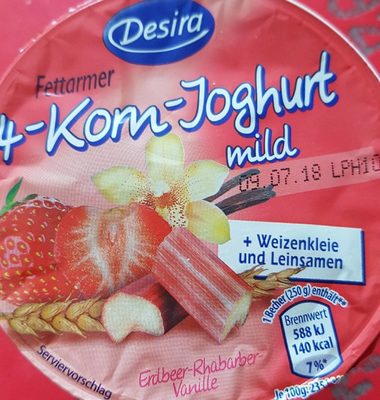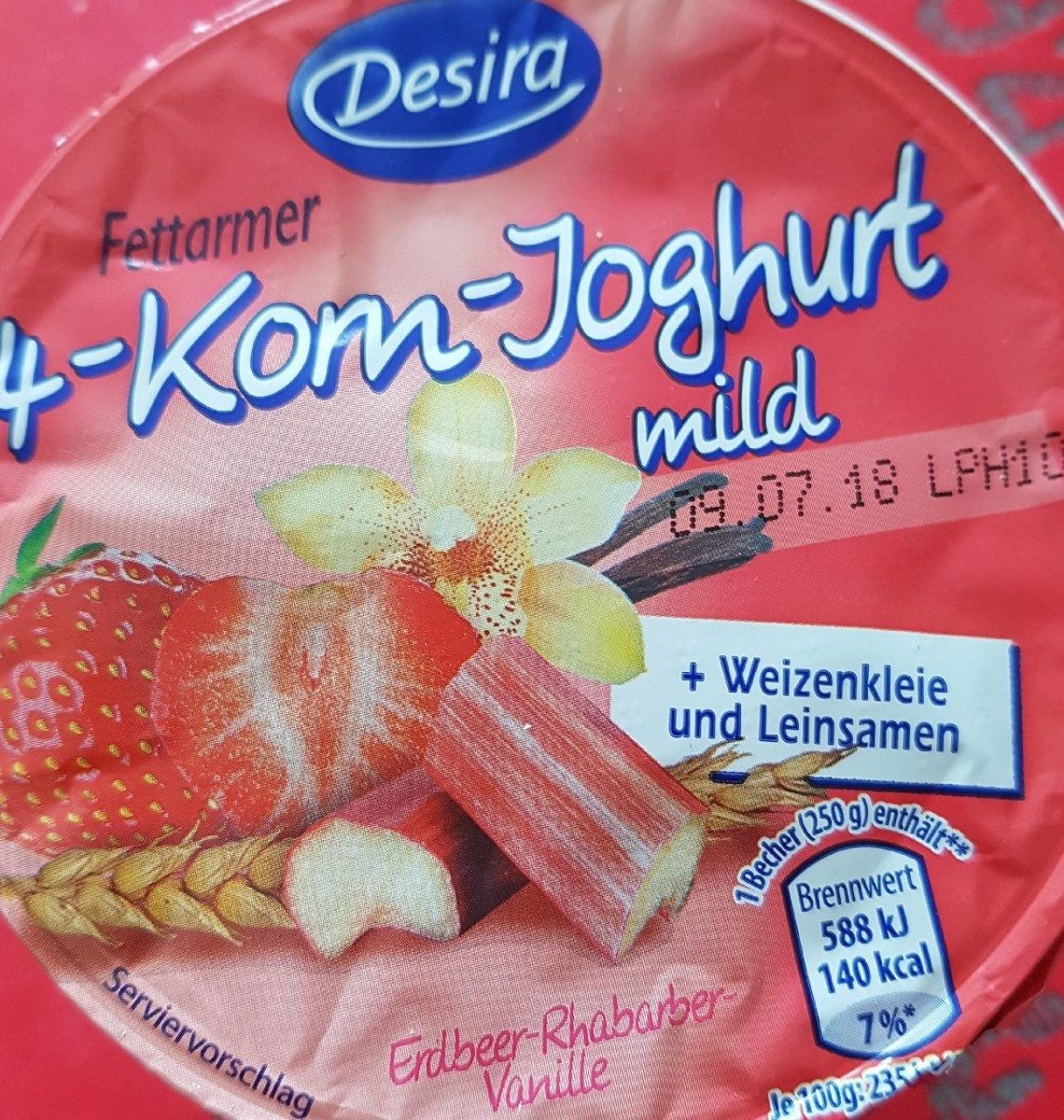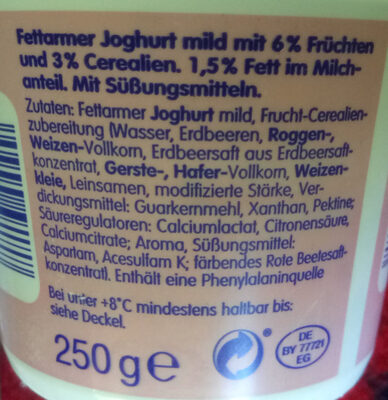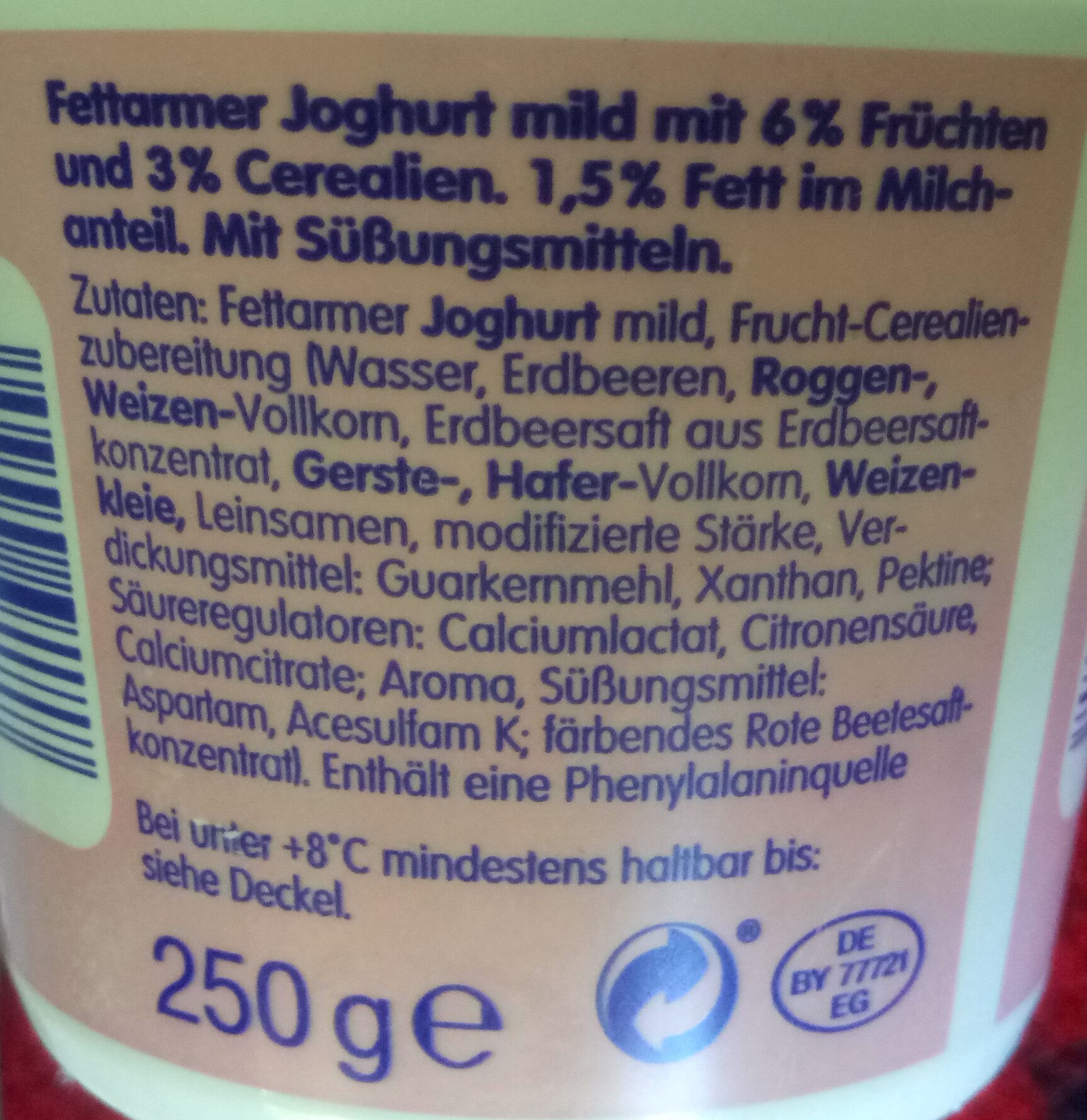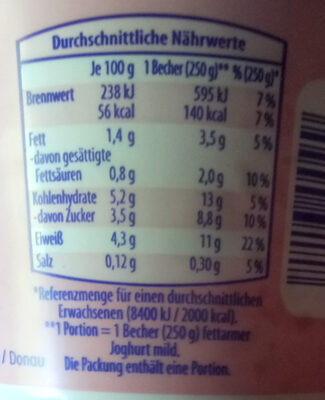Help us make food transparency the norm!
As a non-profit organization, we depend on your donations to continue informing consumers around the world about what they eat.
The food revolution starts with you!
Leichter 4 Korn Joghurt mild, Bircher Müsli, +Weiz... - Desira - 250 g
Leichter 4 Korn Joghurt mild, Bircher Müsli, +Weiz... - Desira - 250 g
Ambiguous barcode: This product has a Restricted Circulation Number barcode for products within a company. This means that different producers and stores can use the same barcode for different products.
×
This product page is not complete. You can help to complete it by editing it and adding more data from the photos we have, or by taking more photos using the app for Android or iPhone/iPad. Thank you!
×
Barcode: 22130099
Common name: Fruchtjoghurt
Quantity: 250 g
Packaging: Plastic, Pp-polypropylene
Categories: Dairies, Fermented foods, Fermented milk products, Desserts, Dairy desserts, Fermented dairy desserts, Yogurts
Labels, certifications, awards: Contains a source of phenylalanine
Origin of ingredients: de:Niemcy
Manufacturing or processing places: Günzburg/Donau, Deutschland
Traceability code: DE BY77721 EG
Countries where sold: Germany
Matching with your preferences
Health
Ingredients
-
27 ingredients
: Fettarmer Joghurt mild, Frucht-Cerealien zubereitung (Wasser, Erdbeeren, Roggen - Weizen-Vollkorn, Erdbeersaft aus Erdbeersaf - konzentrat, Gerste-, Hafer-Vollkom, Weizen - kleie,Leinsamen, modifizierle Stärke, Verdrckungsmittel: Guarkernmehl, Xanthan, Pektine; Säureregulatoren: Calciumlactat, Citronensaure, Calciumcitrate; Aroma, Süßungsmittel: Aspartam, Acesulfam K; färbendes Rote Beelesaftkonzentrat). Enthält eine Phenylalaninquelle.Allergens: Gluten, Milk
Food processing
-
Ultra processed foods
Elements that indicate the product is in the 4 - Ultra processed food and drink products group:
- Additive: E327 - Calcium lactate
- Additive: E412 - Guar gum
- Additive: E415 - Xanthan gum
- Additive: E440 - Pectins
- Additive: E950 - Acesulfame k
- Additive: E951 - Aspartame
- Ingredient: Flavouring
- Ingredient: Sweetener
Food products are classified into 4 groups according to their degree of processing:
- Unprocessed or minimally processed foods
- Processed culinary ingredients
- Processed foods
- Ultra processed foods
The determination of the group is based on the category of the product and on the ingredients it contains.
Additives
-
E327 - Calcium lactate
Calcium lactate: Calcium lactate is a white crystalline salt with formula C6H10CaO6, consisting of two lactate anions H3C-CHOH-CO−2 for each calcium cation Ca2+. It forms several hydrates, the most common being the pentahydrate C6H10CaO6·5H2O. Calcium lactate is used in medicine, mainly to treat calcium deficiencies; and as a food additive with E number of E327. Some cheese crystals consist of calcium lactate.Source: Wikipedia
-
E330 - Citric acid
Citric acid is a natural organic acid found in citrus fruits such as lemons, oranges, and limes.
It is widely used in the food industry as a flavor enhancer, acidulant, and preservative due to its tart and refreshing taste.
Citric acid is safe for consumption when used in moderation and is considered a generally recognized as safe (GRAS) food additive by regulatory agencies worldwide.
-
E333 - Calcium citrates
Calcium citrate: Calcium citrate is the calcium salt of citric acid. It is commonly used as a food additive -E333-, usually as a preservative, but sometimes for flavor. In this sense, it is similar to sodium citrate. Calcium citrate is also found in some dietary calcium supplements -e.g. Citracal-. Calcium makes up 24.1% of calcium citrate -anhydrous- and 21.1% of calcium citrate -tetrahydrate- by mass. The tetrahydrate occurs in nature as the mineral Earlandite.Source: Wikipedia
-
E412 - Guar gum
Guar gum (E412) is a natural food additive derived from guar beans.
This white, odorless powder is valued for its remarkable thickening and stabilizing properties, making it a common ingredient in various food products, including sauces, dressings, and ice creams.
When used in moderation, guar gum is considered safe for consumption, with no known adverse health effects.
-
E415 - Xanthan gum
Xanthan gum (E415) is a natural polysaccharide derived from fermented sugars, often used in the food industry as a thickening and stabilizing agent.
This versatile food additive enhances texture and prevents ingredient separation in a wide range of products, including salad dressings, sauces, and gluten-free baked goods.
It is considered safe for consumption even at high intake amounts.
-
E440 - Pectins
Pectins (E440) are natural carbohydrates, predominantly found in fruits, that act as gelling agents in the food industry, creating the desirable jelly-like texture in jams, jellies, and marmalades.
Pectins stabilize and thicken various food products, such as desserts, confectioneries, and beverages, ensuring a uniform consistency and quality.
Recognized as safe by various health authorities, pectins have been widely used without notable adverse effects when consumed in typical dietary amounts.
-
E950 - Acesulfame k
Acesulfame potassium: Acesulfame potassium - AY-see-SUL-faym-, also known as acesulfame K -K is the symbol for potassium- or Ace K, is a calorie-free sugar substitute -artificial sweetener- often marketed under the trade names Sunett and Sweet One. In the European Union, it is known under the E number -additive code- E950. It was discovered accidentally in 1967 by German chemist Karl Clauss at Hoechst AG -now Nutrinova-. In chemical structure, acesulfame potassium is the potassium salt of 6-methyl-1‚2,3-oxathiazine-4-3H--one 2‚2-dioxide. It is a white crystalline powder with molecular formula C4H4KNO4S and a molecular weight of 201.24 g/mol.Source: Wikipedia
-
E951 - Aspartame
Aspartame: Aspartame -APM- is an artificial non-saccharide sweetener used as a sugar substitute in some foods and beverages. In the European Union, it is codified as E951. Aspartame is a methyl ester of the aspartic acid/phenylalanine dipeptide. A panel of experts set up by the European Food Safety Authority concluded in 2013 that aspartame is safe for human consumption at current levels of exposure. As of 2018, evidence does not support a long-term benefit for weight loss or in diabetes. Because its breakdown products include phenylalanine, people with the genetic condition phenylketonuria -PKU- must be aware of this as an additional source.It was first sold under the brand name NutraSweet. It was first made in 1965, and the patent expired in 1992. It was initially approved for use in food products by the U.S. Food and Drug Administration -FDA- in 1981. The safety of aspartame has been the subject of several political and medical controversies, United States congressional hearings, and Internet hoaxes.Source: Wikipedia
Ingredients analysis
-
Palm oil content unknown
Unrecognized ingredients: de:frucht-cerealien-zubereitung, de:weizen-vollkorn, de:erdbeersaft-aus-erdbeersaf, de:konzentrat, de:hafer-vollkom, de:modifizierle-stärke, de:verdrckungsmittel, de:färbendes-rote-beelesaftkonzentratSome ingredients could not be recognized.
We need your help!
You can help us recognize more ingredients and better analyze the list of ingredients for this product and others:
- Edit this product page to correct spelling mistakes in the ingredients list, and/or to remove ingredients in other languages and sentences that are not related to the ingredients.
- Add new entries, synonyms or translations to our multilingual lists of ingredients, ingredient processing methods, and labels.
If you would like to help, join the #ingredients channel on our Slack discussion space and/or learn about ingredients analysis on our wiki. Thank you!
-
Non-vegan
Non-vegan ingredients: Skimmed mild yogurtSome ingredients could not be recognized.
We need your help!
You can help us recognize more ingredients and better analyze the list of ingredients for this product and others:
- Edit this product page to correct spelling mistakes in the ingredients list, and/or to remove ingredients in other languages and sentences that are not related to the ingredients.
- Add new entries, synonyms or translations to our multilingual lists of ingredients, ingredient processing methods, and labels.
If you would like to help, join the #ingredients channel on our Slack discussion space and/or learn about ingredients analysis on our wiki. Thank you!
-
Vegetarian status unknown
Unrecognized ingredients: de:frucht-cerealien-zubereitung, de:weizen-vollkorn, de:erdbeersaft-aus-erdbeersaf, de:konzentrat, de:hafer-vollkom, de:modifizierle-stärke, de:verdrckungsmittel, de:färbendes-rote-beelesaftkonzentratSome ingredients could not be recognized.
We need your help!
You can help us recognize more ingredients and better analyze the list of ingredients for this product and others:
- Edit this product page to correct spelling mistakes in the ingredients list, and/or to remove ingredients in other languages and sentences that are not related to the ingredients.
- Add new entries, synonyms or translations to our multilingual lists of ingredients, ingredient processing methods, and labels.
If you would like to help, join the #ingredients channel on our Slack discussion space and/or learn about ingredients analysis on our wiki. Thank you!
-
Details of the analysis of the ingredients
We need your help!
Some ingredients could not be recognized.
We need your help!
You can help us recognize more ingredients and better analyze the list of ingredients for this product and others:
- Edit this product page to correct spelling mistakes in the ingredients list, and/or to remove ingredients in other languages and sentences that are not related to the ingredients.
- Add new entries, synonyms or translations to our multilingual lists of ingredients, ingredient processing methods, and labels.
If you would like to help, join the #ingredients channel on our Slack discussion space and/or learn about ingredients analysis on our wiki. Thank you!
: Fettarmer Joghurt mild, Frucht-Cerealien zubereitung (Wasser, Erdbeeren, Roggen, Weizen-Vollkorn, Erdbeersaft aus Erdbeersaf, konzentrat, Gerste, Hafer-Vollkom, Weizen, kleie, Leinsamen, modifizierle Stärke, Verdrckungsmittel (Guarkernmehl), Xanthan, Pektine, Säureregulatoren (Calciumlactat), Citronensaure, Calciumcitrate, Aroma, Süßungsmittel (Aspartam), Acesulfam K, färbendes Rote Beelesaftkonzentrat)- Fettarmer Joghurt mild -> en:skimmed-mild-yogurt - vegan: no - vegetarian: yes - ciqual_proxy_food_code: 19593 - percent_min: 50 - percent_max: 100
- Frucht-Cerealien zubereitung -> de:frucht-cerealien-zubereitung - percent_min: 0 - percent_max: 50
- Wasser -> en:water - vegan: yes - vegetarian: yes - ciqual_food_code: 18066 - percent_min: 0 - percent_max: 50
- Erdbeeren -> en:strawberry - vegan: yes - vegetarian: yes - ciqual_food_code: 13014 - percent_min: 0 - percent_max: 25
- Roggen -> en:rye - vegan: yes - vegetarian: yes - ciqual_food_code: 9390 - percent_min: 0 - percent_max: 16.6666666666667
- Weizen-Vollkorn -> de:weizen-vollkorn - percent_min: 0 - percent_max: 12.5
- Erdbeersaft aus Erdbeersaf -> de:erdbeersaft-aus-erdbeersaf - percent_min: 0 - percent_max: 10
- konzentrat -> de:konzentrat - percent_min: 0 - percent_max: 8.33333333333333
- Gerste -> en:barley - vegan: yes - vegetarian: yes - percent_min: 0 - percent_max: 7.14285714285714
- Hafer-Vollkom -> de:hafer-vollkom - percent_min: 0 - percent_max: 6.25
- Weizen -> en:wheat - vegan: yes - vegetarian: yes - ciqual_proxy_food_code: 9410 - percent_min: 0 - percent_max: 5.55555555555556
- kleie -> en:bran - vegan: yes - vegetarian: yes - percent_min: 0 - percent_max: 5
- Leinsamen -> en:flax-seed - vegan: yes - vegetarian: yes - ciqual_food_code: 15034 - percent_min: 0 - percent_max: 4.54545454545455
- modifizierle Stärke -> de:modifizierle-stärke - percent_min: 0 - percent_max: 4.16666666666667
- Verdrckungsmittel -> de:verdrckungsmittel - percent_min: 0 - percent_max: 3.84615384615385
- Guarkernmehl -> en:e412 - vegan: yes - vegetarian: yes - percent_min: 0 - percent_max: 3.84615384615385
- Xanthan -> en:e415 - vegan: yes - vegetarian: yes - percent_min: 0 - percent_max: 3.57142857142857
- Pektine -> en:e440a - vegan: yes - vegetarian: yes - percent_min: 0 - percent_max: 3.33333333333333
- Säureregulatoren -> en:acidity-regulator - percent_min: 0 - percent_max: 3.125
- Calciumlactat -> en:e327 - vegan: yes - vegetarian: yes - percent_min: 0 - percent_max: 3.125
- Citronensaure -> en:e330 - vegan: yes - vegetarian: yes - percent_min: 0 - percent_max: 2.94117647058824
- Calciumcitrate -> en:e333 - vegan: yes - vegetarian: yes - percent_min: 0 - percent_max: 2.77777777777778
- Aroma -> en:flavouring - vegan: maybe - vegetarian: maybe - percent_min: 0 - percent_max: 2.63157894736842
- Süßungsmittel -> en:sweetener - percent_min: 0 - percent_max: 2.5
- Aspartam -> en:e951 - vegan: yes - vegetarian: yes - percent_min: 0 - percent_max: 2.5
- Acesulfam K -> en:e950 - vegan: yes - vegetarian: yes - percent_min: 0 - percent_max: 2.38095238095238
- färbendes Rote Beelesaftkonzentrat -> de:färbendes-rote-beelesaftkonzentrat - percent_min: 0 - percent_max: 2.27272727272727
Nutrition
-
Very good nutritional quality
⚠ ️Warning: the amount of fiber is not specified, their possible positive contribution to the grade could not be taken into account.⚠ ️Warning: the amount of fruits, vegetables and nuts is not specified on the label, it was estimated from the list of ingredients: 6This product is not considered a beverage for the calculation of the Nutri-Score.
Positive points: 2
- Proteins: 2 / 5 (value: 4.3, rounded value: 4.3)
- Fiber: 0 / 5 (value: 0, rounded value: 0)
- Fruits, vegetables, nuts, and colza/walnut/olive oils: 0 / 5 (value: 6.25, rounded value: 6.3)
Negative points: 0
- Energy: 0 / 10 (value: 243, rounded value: 243)
- Sugars: 0 / 10 (value: 4, rounded value: 4)
- Saturated fat: 0 / 10 (value: 0.8, rounded value: 0.8)
- Sodium: 0 / 10 (value: 48, rounded value: 48)
The points for proteins are counted because the negative points are less than 11.
Nutritional score: (0 - 2)
Nutri-Score:
-
Nutrient levels
-
Fat in low quantity (1.4%)
What you need to know- A high consumption of fat, especially saturated fats, can raise cholesterol, which increases the risk of heart diseases.
Recommendation: Limit the consumption of fat and saturated fat- Choose products with lower fat and saturated fat content.
-
Saturated fat in low quantity (0.8%)
What you need to know- A high consumption of fat, especially saturated fats, can raise cholesterol, which increases the risk of heart diseases.
Recommendation: Limit the consumption of fat and saturated fat- Choose products with lower fat and saturated fat content.
-
Sugars in low quantity (4%)
What you need to know- A high consumption of sugar can cause weight gain and tooth decay. It also augments the risk of type 2 diabetes and cardio-vascular diseases.
Recommendation: Limit the consumption of sugar and sugary drinks- Sugary drinks (such as sodas, fruit beverages, and fruit juices and nectars) should be limited as much as possible (no more than 1 glass a day).
- Choose products with lower sugar content and reduce the consumption of products with added sugars.
-
Salt in low quantity (0.12%)
What you need to know- A high consumption of salt (or sodium) can cause raised blood pressure, which can increase the risk of heart disease and stroke.
- Many people who have high blood pressure do not know it, as there are often no symptoms.
- Most people consume too much salt (on average 9 to 12 grams per day), around twice the recommended maximum level of intake.
Recommendation: Limit the consumption of salt and salted food- Reduce the quantity of salt used when cooking, and don't salt again at the table.
- Limit the consumption of salty snacks and choose products with lower salt content.
-
-
Nutrition facts
Nutrition facts As sold
for 100 g / 100 mlAs sold
per serving (250g)Compared to: Yogurts Energy 243 kj
(58 kcal)608 kj
(145 kcal)-34% Fat 1.4 g 3.5 g -48% Saturated fat 0.8 g 2 g -52% Carbohydrates 5.8 g 14.5 g -47% Sugars 4 g 10 g -59% Fiber ? ? Proteins 4.3 g 10.8 g +1% Salt 0.12 g 0.3 g +3% Fruits‚ vegetables‚ nuts and rapeseed‚ walnut and olive oils (estimate from ingredients list analysis) 6.25 % 6.25 %
Environment
-
Eco-Score B - Low environmental impact
⚠ ️Select a country in order to include the full impact of transportation.The Eco-Score is an experimental score that summarizes the environmental impacts of food products.→ The Eco-Score was initially developped for France and it is being extended to other European countries. The Eco-Score formula is subject to change as it is regularly improved to make it more precise and better suited to each country.Life cycle analysis
-
Average impact of products of the same category: A (Score: 87/100)
Category: Yogurt, fermented milk or dairy specialty, plain
Category: Yogurt, fermented milk or dairy specialty, plain
- PEF environmental score: 0.22 (the lower the score, the lower the impact)
- including impact on climate change: 2.12 kg CO2 eq/kg of product
Stage Impact Agriculture
67.6 %Processing
13.5 %Packaging
6.8 %Transportation
7.0 %Distribution
4.0 %Consumption
1.1 %
Bonuses and maluses
-
Missing origins of ingredients information
Malus: -5
⚠ ️ The origins of the ingredients of this product are not indicated.
If they are indicated on the packaging, you can modify the product sheet and add them.
If you are the manufacturer of this product, you can send us the information with our free platform for producers.
-
Packaging with a medium impact
Malus: -8
Shape Material Recycling Impact Unknown PP 5 - Polypropylene High ⚠ ️ The information about the packaging of this product is not sufficiently precise (exact shapes and materials of all components of the packaging).⚠ ️ For a more precise calculation of the Eco-Score, you can modify the product page and add them.
If you are the manufacturer of this product, you can send us the information with our free platform for producers.
Eco-Score for this product
-
Impact for this product: B (Score: 74/100)
Product: Leichter 4 Korn Joghurt mild, Bircher Müsli, +Weiz... - Desira - 250 g
Life cycle analysis score: 87
Sum of bonuses and maluses: -13
Final score: 74/100
-
Carbon footprint
-
Equal to driving 1.1 km in a petrol car
212 g CO² per 100g of product
The carbon emission figure comes from ADEME's Agribalyse database, for the category: Yogurt, fermented milk or dairy specialty, plain (Source: ADEME Agribalyse Database)
Stage Impact Agriculture
72.9 %Processing
7.1 %Packaging
8.5 %Transportation
9.5 %Distribution
1.7 %Consumption
0.3 %
Packaging
-
Packaging with a medium impact
-
Packaging parts
(PP 5 - Polypropylene)
-
Packaging materials
Material % Packaging weight Packaging weight per 100 g of product Plastic
-
Transportation
-
Origins of ingredients
Missing origins of ingredients information
⚠ ️ The origins of the ingredients of this product are not indicated.
If they are indicated on the packaging, you can modify the product sheet and add them.
If you are the manufacturer of this product, you can send us the information with our free platform for producers.Add the origins of ingredients for this product Add the origins of ingredients for this product
Report a problem
-
Incomplete or incorrect information?
Category, labels, ingredients, allergens, nutritional information, photos etc.
If the information does not match the information on the packaging, please complete or correct it. Open Food Facts is a collaborative database, and every contribution is useful for all.
Data sources
Product added on by kiliweb
Last edit of product page on by roboto-app.
Product page also edited by 345y0h, openfoodfacts-contributors, packbot, pyrka, sil, stivolonski, tacite-mass-editor, williama, yuka.WC93TVBhbzdndXNtdk1BOHB3ajErNGwwMmJDQVdtMlBjZTFCSUE9PQ, yuka.WmIwRFNLZ1RxOEFwdGMxajhpcjQvNGx0OW9UM0JEbUxkdVEzSVE9PQ.
